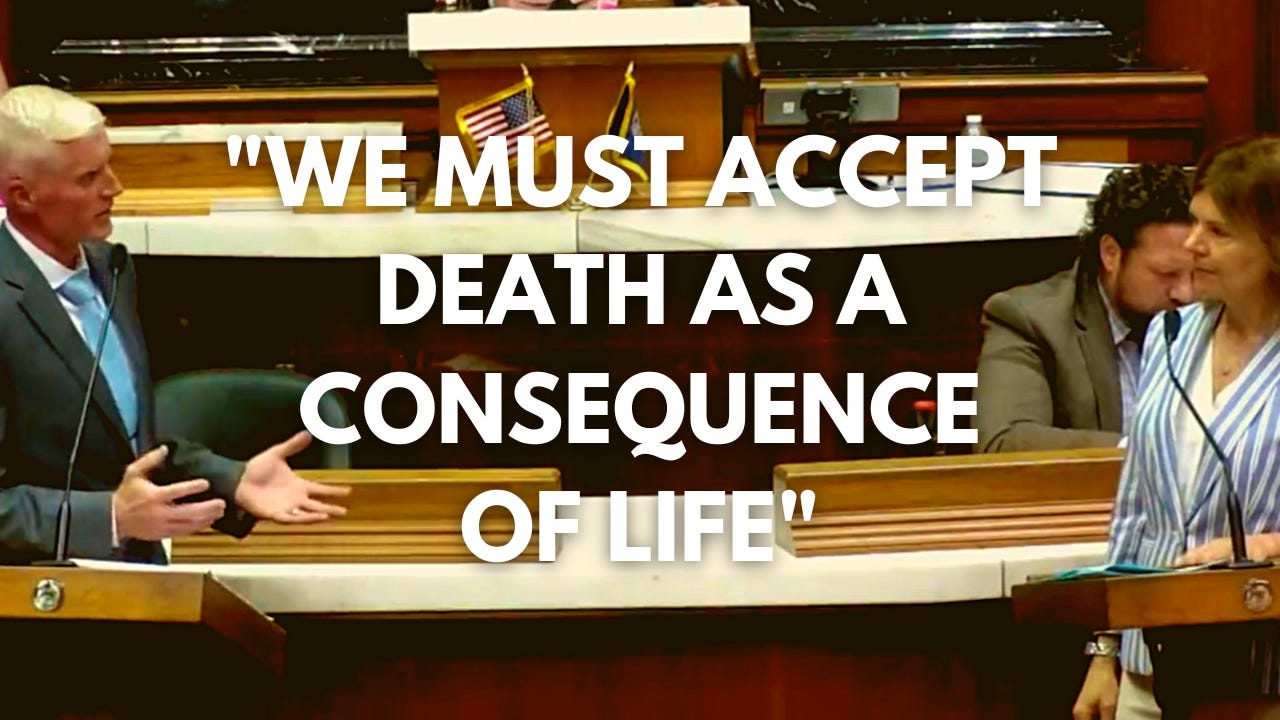"We Must Accept Death As a Consequence of Life": The GOP and the Trajectory of Material History
An awkward exchange in the Indiana legislature revealed more than terrible messaging
Early in August, as the Indiana legislature debated becoming the first state to pass an abortion ban in the wake of the fall of Roe V. Wade, tensions ran high. Though the passage was inevitable, Democratic members pressed backers on the brutal specifics of the bill, including Representative Rita Fleming, who made Karen Engleman admit the state would force a 10-year-old victim of rape to birth their rapist’s child.
However, the most revealing moment came when Republican J. Michael Davisson was asked what he would tell the children of a mother forced to carry a nonviable pregnancy to term.

Davisson’s response is incredibly disturbing and bizarre, but also telling. When it comes to forced birth, which is, besides cultural warfare and assisting the wealthy accrue more capital, is as close to Republican orthodoxy at the moment as anything else. You can wrap it up in religious stories, flowery rhetoric, whatever you want, but you cannot defend it. It is unvarnished cruelty.
And that cruelty is, as people have noted since the rise of Donald Trump, largely the point. But what is behind the cruelty? The gleeful, snarling cruelty that punctuates every speech, every tweet, every piece of legislation? Besides an obvious predilection within the party for viciousness and an environment of polarization that rewards it financially and politically, what exactly is at the heart of this?
Simply put, we have arrived at a moment of choosing. And to understand what that means, what it entails, and what it possibly means for our future, we must look beyond the individuals and the pageantry and parse this thing for its material conditions. Behind the GOP’s authoritarian push is a situation that has been percolating for a long, long time, and as we watch our political environment curdle and convulse, we are witnessing the consequences of those conditions.
“We must accept death as a consequence of life” doesn’t read well on a bumper sticker, but it is, without a doubt, the principle foundation of the modern Republican Party, and a dismal preview of what might lie in store should we not defeat this movement.
In the post-World War II environment, the United States of America was poised to become the most powerful country in the history of the world. The catastrophic damage left America to dominate economically and politically, creating a new world order in which material life for Americans - white Americans, at least - was fated to improve by leaps and bounds.
This story is well-known. It forms the backbone of Donald Trump’s “Make American Great Again” narrative, a mythology that casts that moment as not only the pinnacle of the country’s modern history, but a Heaven-on-Earth to which Americans could make real again, if only they embrace Trump and the Republicans with a cultish devotion.
That era and its trappings, including the rise in living conditions and economic fortunes, was merely a brief pocket before it gave way to something else. This modern moment we find ourselves in, with its indignities, its worsening conditions, its increasing exploitation, shortening life spans and avalanche of preventable deaths from “misery,” is another era entirely.
While the post-war era was considered an idyllic paradise and framed as something we could return to, this era is marked by violence - economic, political, cultural, and literal violence - originating from a decline the system has deemed necessary.
But how did we arrive here? And what can be done?



